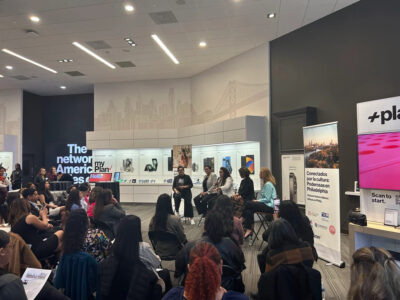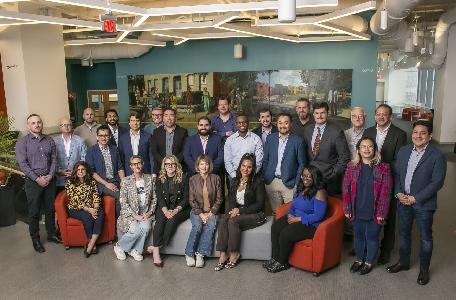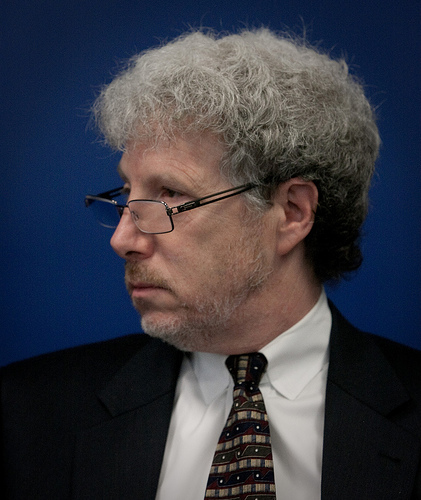No last-minute, top-level transitions of strategy or resources will need to be made today in the Division of Technology. Today is the final, official day in which Allan Frank will serve as the City of Philadelphia’s first cabinet-level Chief Technology Officer, but the transition will happen quietly.
After all, even though his leaving was only announced in November, Frank says his interim successor Tommy Jones, whom we interviewed last week, has been learning the big lessons since taking the deputy role at the end of 2009.
What will happen today is the official start of describing what the legacy will be for the first public leader of technology in the history of Philadelphia.
Frank served the city for two and a half years. He welcomed in an ‘unprecedented’ five-year, $120 million IT budget that is now being funded and oversaw the beginning of city IT consolidation, network infrastructure upgrades and serious moves toward releasing new data for third-party developers. But very little was actually accomplished, his critics cry: a pound of conversation for every ounce of completion.
“Technology touches every part of Philadelphia,” Frank says. “So let the people talk.”
So while Frank points to three primary accomplishments — that broad five-year, $120 million Digital Philadelphia vision, successful applications for federal broadband stimulus funding and the infrastructure improvements — others suggest Frank was more talk than action on all and many other other accounts.
Is Allan Frank the great initiator or the great procrastinator of technology in Philadelphia?
THE MAN
“Let’s say I give him an ‘A- for enthusiasm and a C+ for implementation,” says City Councilman Bill Green, whose prognostications have grown in fervor the more Inquirer reporters refer to him as a future mayoral candidate. [For his own part, Frank gives himself an A for public work and B- for inter-agency initiatives.]
“We in the city never seem to find the guy who is going to implement the plan,” says Green. “We have some great ideas, but his leaving is another delay. It’s going to take time to find a replacement and then we’ll have a new start and some new ideas, and then I wonder if it is too late [to see any change] during the Nutter administration.”
Of course, it is very clear who will be officially in charge of IT in Philadelphia tomorrow: Tommy Jones. And Frank interjects often that he isn’t going anywhere. Though Frank is going back to private consulting, he’s keeping his wife and kids in the Overbrook Farms home they bought within city limits to take the job in 2008 — “we love it,” he says — and will be chairing the newly formed Mayor’s Advisory Board on Technology.
But by most accounts, the brash and boastful, big picture braggadocio is leaving the Division of Technology with Allan Frank.
Where Frank has put a face on his position, the first cabinet-level, technology head in the City of Philadelphia, one who challenged skeptical technologists and entrepreneurs to believe a more advanced, innovative city government is possible, his replacement Tommy Jones is charged with actually making it happen. Frank seems to embrace attention, while Jones says he “avoids the newspaper.”

Mayor Michael Nutter greets guests while Chief Technology Officer Allan Frank offers remarks during the Information Technology Opportunity Summit. Copyright City of Philadelphia. Photograph by Mitchell Leff.
BIG PICTURE AND BIG TABLE
Todd Wolfson, founder of the Media Mobilizing Project, says that Frank’s overall vision was strong.
“[Frank had] two skill sets that were effective. First, trying to create a top-level vision around what needed to happen. Where the city is going to be in 2050, not what I need to do today,” Wolfson says. “Second, he was comfortable seeding territory in areas he didn’t have the best on-the-ground vision.”
Wolfson, who helped draft one of the City’s winning stimulus grant applications for broadband adoption projects, says that it was that hands-off approach that helped the city win.
“He let us create the vision and not step in too much,” Wolfson says.
That much the City Councilman son-of-a-former-mayor agrees with.
“For the broadband stimulus stuff and the Google fiber project, he knew there were a lot of stakeholders and I think he did a good job of inviting them in,” Green says. “He didn’t take a ‘we know best’ attitude, and I think those initiatives were stronger because of it.”
And in more than a half dozen interviews with stakeholders in and out of government, no one argued the fact that far fewer people were talking about city IT policy before Frank came on the scene.
BREAD AND CIRCUSES
“Allan convinced me to come up here,” says now interim CTO Tommy Jones, who left a deputy stead in the Washington D.C. government in 2009 to serve under Frank. “His passion for wanting to fix Philly is unmatched and infectious.”
One word that those who know him often ascribe to Frank is “energy.”
Less than a month before announcing he was leaving, Frank was the featured speaker at a private event for government employees. If he wasn’t a rock star, he was at least a mid-level celebrity in a celebrity-starved city. He doesn’t walk like a bureaucrat, he doesn’t talk like a bureaucrat, he says he doesn’t work like a bureaucrat. And if only because he preaches in wild metaphor, paints rosy pictures of the future and will lean in close to say something private, he excited outsiders with a bold vision while, he says, he also addressed the fundamental infrastructure concerns of an outdated municipal government IT.
For almost two years, in each interview with Technically Philly, Frank would contort his body, wrench his arms, lean backward and forward, reach out and touch a hand or a leg and generally move in a way that suggests it would be impossible to pin him down. In truth, he talks in much the same way.
RUNNING THE RAILROAD
It might help to put Frank’s work into two categories.
First, there are the public facing projects, like that big, bold, five-year vision, the mostly successful broadband stimulus applications, applying for Code for America fellows (who arrived this week) and a thus far failed, but inclusive, bid for Google-funded experimental, super high-speed broadband internet. In these areas, aside from some casual criticism (“I remain unimpressed,” says Alex Hillman, the co-founder of co-working space Independents Hall) Frank is mostly credited for doing what no one in the city IT space has before — actually making a few thousand residents know who he is and care. This is the area Frank gives himself an A.
Below, watch Frank speak about the Google fiber initiative.
[tech]xlWaefRKXk4[/tech]
In the second area, where Frank grades his performance a B-, the businessman who helped build a very large tech consulting firm in the 1990s was in charge of IT for one of the largest city governments in the country. That’s what he, and his staff, call repetitively ‘running the railroad.’
“People would say, you can’t work in government,” Frank says, proud of his reputation as an entrepreneur. “But I did, and, yes, I was naive, but I don’t think I did such a bad job.”
“He was an effective leader in the sense that he was able to identify what the issues are and convince people that it’s worth making an investment in IT,” said Anuj Gupta, once a city employee who worked with the Division of Technology on projects while he was in the Managing Director’s Office, and later, in the Department of Licenses and Inspections. “He was contending with decades of disinvestment that anyone would be hard pressed to move to becoming a model of efficiency overnight.”
Two initiatives dominate this part of tenure: the $120 million, five-year plan and the consolidation of IT services across more than 30 city agencies. The first was meant to bring Philadelphia “into the 20th century, so we can move on to the 21st,” Frank once said. The second was meant to cut costs, pool talent and improve city IT services: from network capacity to help desk initiatives to more public innovations.
The ‘Digital Philadelphia‘ plan was innovative and comprehensive and exciting, Councilman Green says, “but nothing is done.” Green also credits Frank with starting the IT consolidation move, but, he says, even that can’t be called a victory yet.
“Most of the IT staff involved in that change are still at the same desks answering the same phones,” Green says.
“Really,” Green goes on, leaning back in a chair in his City Hall office in December, “my only thought is ‘let’s get moving.”
“Is there way more ahead of us than behind? Yes,” says Division of Technology Chief of Staff Jeff Friedman. “But have we made significant strides forward? Call me a bad source for being so positive, but, yes, we have pushed the ball forward in real ways in three years of work under Allan.”
So the questions seem to land on time. How long does it take to transform a wide-ranging city IT system with political minefields into a modern, functional department? That remains the debate.
“Allan had a vision and put 150 percent of his soul into moving Philly forward, and he has moved it ahead leaps and bounds,” says interim CTO Jones. “Of course, he left it to me to make it work.”
-30-
Staff writer Brian James Kirk contributed to this report.

Join the conversation!
Find news, events, jobs and people who share your interests on Technical.ly's open community Slack

Philly daily roundup: A better coffee supply chain; Philly Tech Week returns; Apply to Pennovation Accelerator

Philly daily roundup: Startups want office culture; New Venture Lab cohort; Penn Med's new AI leader

Will the life sciences dethrone software as the king of technology?


